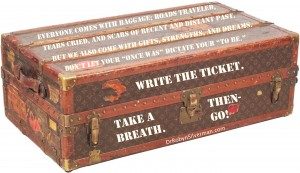Walmart Kidnapping: How can I keep my child safe from unkind strangers?
 My Facebook page is hopping today after I posted about the little girl, Brittney Baxter, age 7, who fought her way out of getting kidnapped from Walmart yesterday, when a man grabbed her, covered her mouth and tried to subdue her. The girl is safe and the alleged kidnapper in custody, but these stories of attempted child abduction always leave a trail of fear, frustration, concern, and questions from parents and educators.
My Facebook page is hopping today after I posted about the little girl, Brittney Baxter, age 7, who fought her way out of getting kidnapped from Walmart yesterday, when a man grabbed her, covered her mouth and tried to subdue her. The girl is safe and the alleged kidnapper in custody, but these stories of attempted child abduction always leave a trail of fear, frustration, concern, and questions from parents and educators.
Several parents and concerned citizens have gotten in touch because they are unsure about how they can protect the children in their lives from a similar situation. I wanted to reach out to you to provide some tips. Please feel free to pass it on and repost the link as this is an issue on many people’s minds today.
In terms of “stranger danger,” what are we supposed to tell our young kids?
(1) People are mostly kind…but some aren’t: For the most part, people are good, kind and helpful. But not everyone. “Most people are very kind. When we go to the store, there are many kind people who are there to help you, right? Most people want everyone to be safe and happy. But some people are not kind. Some people do not make safe and kind choices. We don’t always know who the kind and unkind people are because there are no superhero or villain masks in real life.”
(2) Stay by the person who brought you: Your school age children should be told to stay by you or the person who brought them. “When we go out, please stay where I can see you and you can see me. Please don’t wander into the next aisle alone because I won’t be able to see you. Wandering off is an unsafe choice. Staying by me is a safe choice.”
(3) State what you want in the positive as well as in the negative: Wedon’t want to just say “don’t wander off” or “don’t leave the store” but also “please stay where I can see you” and “stay in the store.” Children respond well with what “to do” rather than just telling them what not to do.
(4) Yell as loud as you can: This is not the time for inside voices. “If someone grabs you, yell: “This is not my mom/dad! This is not my mom/dad! Help me! This is not my Mom/Dad!” Make sure they understand that they should not just yell “no” or “leave me alone” because some patrons might simply think that your child is throwing a tantrum with his parent.
(5) Get physical: We always tell our children to keep their hands to themselves. In this “stranger danger” situation, they need permission to get physical. That means kicking, hitting, biting, or whatever they need to do to stay safe. Tell your child to move their legs like they are riding a bicycle as this makes them hard to hold. If someone puts their hand over their mouth, continue to kick—and bite the person’s hand.
(6) Stay aware: It’s easy to get distracted by the toys and games in a big store. Brittney was looking at toys when the kidnapper tried to restrain her. Being aware can give your child time as well as vital information. Say; “keep your eyes and ears open. Know who is around you and what’s going on.”
(7) Don’t go anywhere with a stranger: Educate your child about some tactics to lure young children. Gifts, promises of puppies, toys, or even lies like “Your Mom told me to get you” or “Your Dad is hurt…come with me” might be used. “When you are in a store, you are to stay in the store unless we leave together. Never leave the store without the person you came in with unless Mom/Dad tells you that you can personally.”
(8) If you’re lost…here’s where to go: We don’t want our children to panic if they can’t find us. Tell them to look for someone in the store uniform, go to the service desk, find a cashier, or, it’s often a safe bet to approach a mom with children. “Ask that person for help. Tell them your name and who you are looking for. Tell them that you are lost and you need to find us right away.”
(9) Stand with confidence: Body awareness can be one of the first lines of defense. Think about it; two children—one standing with confidence, head held high, walking as if he knows where he is going and what he is doing vs one who has his shoulders rolled, head and eyes down, unaware of his surroundings. For additional body awareness and self defense, enroll your child is a top notch martial arts academy that teaches children more than just kicking and punching. If you need a recommendation, please ask me—our Powerful Words Member Schools and Personal Development Centers are all over the world.
(10) Trust your gut: This is really a message about all choices. “If your tummy feels weird or you have a little voice inside you that tells you ‘this doesn’t feel right’ or ‘run’ or ‘get closer to Dad/Mom’ then listen to it. That’s your gut speaking. Your gut—that little voice inside you that tells you when something is right or wrong– is very smart.”
The last thing I would tell you is to allow your children to practice. Have them practice yelling, kicking, screaming, punching a pillow, and moving their legs. Have them practice talking to a store clerk and bring them to a store and encourage them to speak to those in uniform so that they get comfortable doing it. My hope is that the children in your life will never need to use many of these tips—better to have them and not need them than need them and not have them.
To the wellness and safety of you and yours-

Huffington Post article about the kidnapping.


 (2) Scars keep me guarded vs scars remind me that wounds heal in time:Betrayal, loss, pain and suffering have a profound effect on the human spirit. Some are cut deep and remain closed off from others—concerned that the wound will easily open and they will be hurt again. While we take a chance with trust, this is no way to live. We guard ourselves from hurt but also from joy. So many choose to try again. To trust again. To love again. And for those who do, they give themselves a chance for new happiness and fulfillment.
(2) Scars keep me guarded vs scars remind me that wounds heal in time:Betrayal, loss, pain and suffering have a profound effect on the human spirit. Some are cut deep and remain closed off from others—concerned that the wound will easily open and they will be hurt again. While we take a chance with trust, this is no way to live. We guard ourselves from hurt but also from joy. So many choose to try again. To trust again. To love again. And for those who do, they give themselves a chance for new happiness and fulfillment. (6) Old baggage stored vs dealt with or dumped: Remember that bully you never faced in elementary school? Can’t forget that one thing your parent, teacher, or friend said to you in 9th grade? Wish you said sorry for something you did in college? Negative memories can hold a lot of weight in the baggage we cart around in life. But they don’t have to. When I first got onto Facebook, I reached out to a bunch of people who I felt I wronged in some way in childhood or adolescence. As a different person now, I wanted to be accountable for my mistakes. I also remained open to others who wanted to do the same with me. They were different people now too. The band aid was finally pulled off—and the memories were reframed, explained, and changed. Some of you can do the same. If the chance has passed by due to death or inability to get in touch, write the letter, say the words, have the conversation with someone else you trust so you can forgive and let it go.
(6) Old baggage stored vs dealt with or dumped: Remember that bully you never faced in elementary school? Can’t forget that one thing your parent, teacher, or friend said to you in 9th grade? Wish you said sorry for something you did in college? Negative memories can hold a lot of weight in the baggage we cart around in life. But they don’t have to. When I first got onto Facebook, I reached out to a bunch of people who I felt I wronged in some way in childhood or adolescence. As a different person now, I wanted to be accountable for my mistakes. I also remained open to others who wanted to do the same with me. They were different people now too. The band aid was finally pulled off—and the memories were reframed, explained, and changed. Some of you can do the same. If the chance has passed by due to death or inability to get in touch, write the letter, say the words, have the conversation with someone else you trust so you can forgive and let it go. Joey, a seven year old boy with big brown eyes and a proven love for mashed potatoes did the unthinkable. Sitting around the holiday table, Joey wanted to show his Aunt Theresa that he could be part of the “clean the plate club” just like his Great Uncle Lester. With great conviction, he picked up his plate and licked it—sending his leftover turkey onto the floor, his unused gravy into his lap, and his mashed potatoes up his nose. Then he sneezed…and no, he didn’t cover his mouth or nose.
Joey, a seven year old boy with big brown eyes and a proven love for mashed potatoes did the unthinkable. Sitting around the holiday table, Joey wanted to show his Aunt Theresa that he could be part of the “clean the plate club” just like his Great Uncle Lester. With great conviction, he picked up his plate and licked it—sending his leftover turkey onto the floor, his unused gravy into his lap, and his mashed potatoes up his nose. Then he sneezed…and no, he didn’t cover his mouth or nose.
 Not feeling too cheerful this holiday season?
Not feeling too cheerful this holiday season? “We make a living by what we get, but we make a life by what we give.” –Winston Churchill
“We make a living by what we get, but we make a life by what we give.” –Winston Churchill Steve Jobs, innovator, inventor, and game-changer died yesterday at the age of 56 from pancreatic cancer. The news of his death, while bringing on mourning of an amazing thinker, prompted those who revered and respected him to focus on his noteworthy influence on the current way we live, work, and enjoy entertainment. It got me thinking. What can our children learn—and how can our parenting be influenced—from looking at the contributions and life path of Steve Jobs?
Steve Jobs, innovator, inventor, and game-changer died yesterday at the age of 56 from pancreatic cancer. The news of his death, while bringing on mourning of an amazing thinker, prompted those who revered and respected him to focus on his noteworthy influence on the current way we live, work, and enjoy entertainment. It got me thinking. What can our children learn—and how can our parenting be influenced—from looking at the contributions and life path of Steve Jobs?